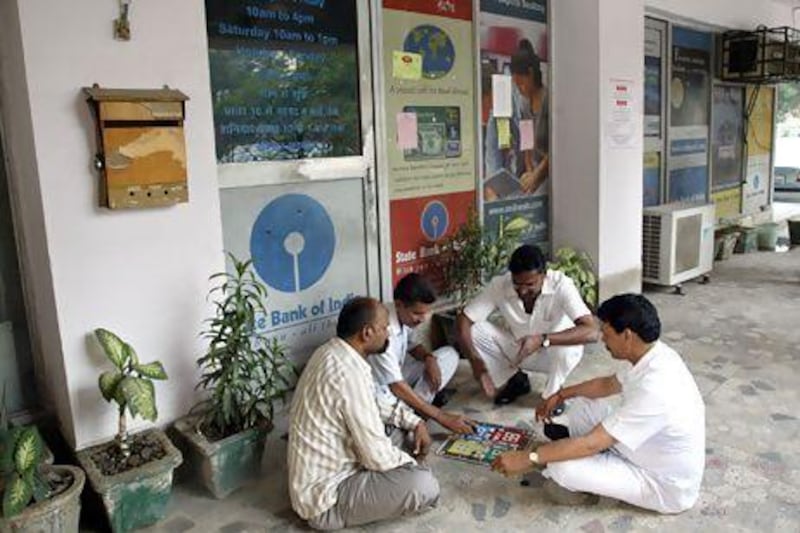NEW DELHI // When Raghu Dharmendra visits temples in remote corners of India, he peers at the floor. If necessary, he takes photographs.
Inevitably, somebody will ask him what he is doing. If he has found what he is looking for, Mr Dharmendra points to lines etched into the floor that make up the template for an old Indian board game.
In the olden days before cardboard and plastic, he explains, the floor would have formed the game board.
"And then people will get excited, and they'll talk about playing the game and tell us how it's played," said Mr Dharmendra, who designs board sets for traditional games for Ramsons Kala Prathishtana, a Mysore-based crafts foundation.
Mr Dharmendra's search in India's small towns and villages has yielded him the details of roughly 40 games, 21 of which his foundation has produced for sale. Every two years, he organises Kreeda Kaushalya, a tournament of traditional board games.
Across the country, a handful of individuals such as Mr Dharmendra are trying to revive interest in traditional Indian board games. Many of them are so ancient that they have travelled overseas and, in turn, inspired some of the West's most venerable games.
Pachisi, dating back to roughly the 6th century, gave rise to Ludo. Another game - called Gyan Chaupar in north India and Paramapadam Sopanam in the south - inspired Snakes & Ladders and may have even contributed key elements of The Game of Life, Milton Bradley's 1860 board game.
But board games in the India of today, competing as they do with computer games, television and the internet, are rapidly fading away.
Indeed, some are on the verge of extinction. Mr Dharmendra cites the example of Tablan, of which he has only ever seen two specimens.
"We don't even properly know the rules of this game yet," he said. "There's a rumour of one family living in north Karnataka that knows the rules well. But we haven't yet been able to go there to find them."
The Ramsons handicrafts showroom in Mysore is about 40 years old, but the foundation's efforts to support craft communities was started only in 1995. Its interest in board games began in 2000, spurred, according to Mr Dharmendra, by one question: "Why aren't we able to find the board games we played as children?"
It is the same question, in essence, that spurred Vinita Sidhartha to start Kreeda Games, a Chennai-based producer of traditional Indian board games.
When the company started in August 2002, she made a few samples and placed them in a couple of stores. "We were sold out in a week," she recalled with a laugh.
Kreeda now has about 20 traditional games on the market and sells more than 15,000 sets a year.
One popular game is Pallanguzhi, a game of arithmetic strategy that uses tamarind seeds or cowry shells as counters. An approximate equivalent called Mancala - named after the Arabic word naqala, for "moved" - is played in many other parts of the world and is thought to be at least 1,300 years old.
Such games, Ms Sidhartha said, bring a certain spontaneity with them.
"Play has become so structured today. When we were kids, we 'played' cricket. Now we 'learn' cricket.
"Parents don't have time to play with their children, and they meet their cousins maybe once or twice a year," she said, recalling how the disappearing joint family system provided a ready supply of playmates.
A game like Pallanguzhi can subtly teach young children the principles of counting and arithmetic, Ms Sidhartha said. But more importantly, it is just fun.
"Anybody who sees these games and learns about them wants to play them. Kids have a blast," she said. "The challenge is really to tell people about our games, because we don't have the major marketing money that the big toy companies have."
Kavade, a toy store in Bangalore, employs small handicrafts groups to produce versions of traditional games and game counters. GS Sreeranjini, who founded Kavade five years ago, said it sells 13 board games in addition to five dozen other Indian games, such as spinning tops and pick-up sticks.
Kavade also holds tournaments in which teams made up of grandparents and grandchildren are invited to participate. "The tournaments are great bonding opportunities, because otherwise people live in such nuclear families these days," Ms Sreeranjini said.
She said games that were popular in many Indian households just 30 or 40 years ago are disappearing. "If you look at today's 20- or 25-year-olds, they hardly even recognise these games."
For Ms Sidhartha, this is what makes her efforts to preserve traditional games worthwhile.
"Even if an additional 10 people in the next generations play these games because I introduced them, "that would make me very happy," she said.
ssubramanian@thenational.ae





